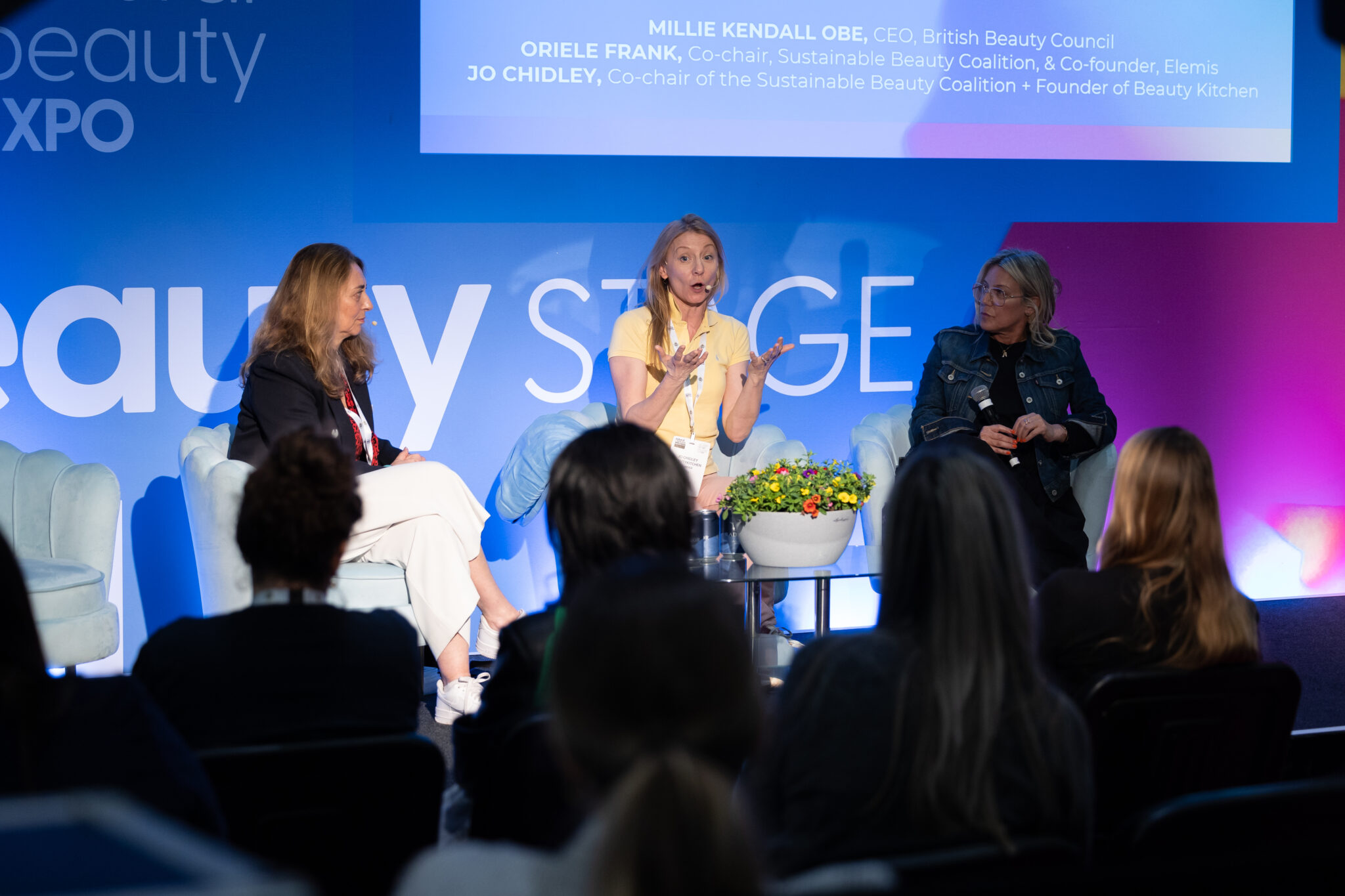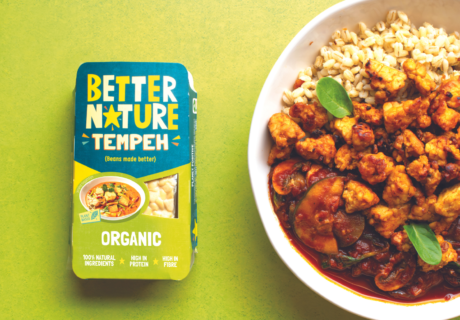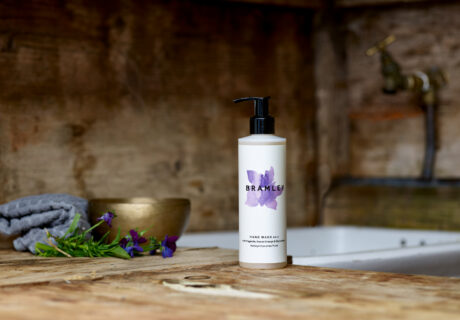A new initiative from the Sustainable Beauty Coalition (SBC), The Great British Beauty Clean Up will revolutionise our retail environment, professional services, use of refillable packaging and recycling for a more sustainable future. Millie Kendall OBE, CEO of the British Beauty Council chaired this panel at Natural & Organic Products Expo 2024, with Sustainable Beauty Coalition co-chairs Jo Chidley, Founder of Beauty Kitchen and co-creator of Reposit, and Oriele Frank, Chief Product Officer and Co-founder of Elemis. We listened in to bring you the key talking points.
Sustainable Beauty Coalition: A brief introduction
Millie Kendall (MK): Back in 2020 we commissioned The Courage to Change, which was a report that delved quite deep into the beauty industry’s impact on climate change… if we keep up current levels of beauty consumption, by 2050, there will be 12 billion tons of plastic in landfills … One of the biggest contributors to this is packaging that our industry cultivates, making up to 70% of our waste. Yet we know recycling rates are very low, with 56% of Brits not recycling bathroom waste. People are not recycling bathroom waste, so what can we do?
Jo Chidley (JC): The Sustainable Beauty Coalition is about collective action. It’s about bringing industry together in a safe, pre-competitive space where we can talk about the issues, particularly within sustainability, because we know that the problems we’ve created … we’re still developing how to solve these problems.
MK: Over the past four years, the Sustainable Beauty Coalition has managed to galvanise a lot of really great minds. But I think that some people are worried that if they aren’t sustainable enough they can’t get involved, which is not really what the Sustainable Beauty Coalition is about. It’s about being on that journey and all sort of working together towards the greater good.
JC: Collective action is about transparency. So you might have a great innovation that’s happened within your particular organisation. How do you share that wide and far so that other people can, you know, replicate it, or get involved? And that’s what collaboration is about. It’s not about what’s in it for me. It’s about what’s in it for us. What’s in it for everyone.
Oriele Frank (OF): [The SBC] was an amazing moment where we all came together as a group … all walks of life, all parts of the beauty industry, and we sat and said, what’s the biggest issue? As an industry, we need to change up and we’re going to be launching next year a consumer campaign called The Great British Beauty Cleanup… We’re just focusing on waste, but we’re covering it under six task forces. So we have a government task force that sits in Millie’s British Beauty Council, who is literally in the door at ten Downing Street, campaigning, lobbying and looking at how we’re approaching waste in the UK and also learning from what’s going on in Europe. The second task force is all about plastic reduction. How do we reduce our plastics? … The third solution, which Jo is a super expert on, is the refill reuse. Then there’s the professional services. And we took the industry and we put the industry in the heart… So spas, salons, hairdressers, nail techs, makeup artists. Then there’s retailers, beauty retailers and then there’s the actual brands. So they form the sort of whole industry piece.
MK: A lot of the work The Great British Beauty Clean Up will do are small things that make a big impact … We are the industry. We’re creating a problem. We need to find solutions.
Reuse, Refill
JC: We know that the single use nature of products is the most problematic for the planet, but it’s convenient, it’s cheap, it’s easy to access … If we think of something like a take back scheme that’s currently in different retailers at the moment, that might be hard to recycle plastics, how do they then transition into something that is more circular and more of a service oriented? Because that’s really what our industry is … So we should be able to transition our products into services fairly easily.
MK: It’s amazing how the food industry have managed to transition the consumer into reuse refill, things like plastic bags. But we’re really struggling with it. We really need to motivate our industry and our consumers to change their mindset.
JC: We have set up all our supply chains for single use. So it’s really difficult to then think of how do you transition and make sure that the supply chain from an ingredient manufacturer to a packaging manufacturer all the way through to going through to a shop, whether that’s online or brick and mortar, to the end uses, and how that is very complicated.
MK: And a lot of ways it’s a change in business model … we’re so indoctrinated to think in a certain way that productivity means profit. And it’s just we keep making stuff and we don’t put the thought behind it.
The single use problem in professional services
OF: I didn’t realise that the aluminium foils that you use when people are dyeing their hair are infinitely recyclable, but only 2% of aluminium foils are actually recycled. So how could we as an industry get that up to 50, 60, 70 back up to 100% … The idea is, particularly in services, we’re going to give sustainable tips of what you could do tomorrow that we’ve collectively put together … we’re trying to ensure that we’re covering people that are on their own as a start up business, right up to larger organisations.
MK: I think it’s interesting how each part of each task force is almost representing different parts of the industry. And it’s like much more of a holistic approach than I would have even thought. Which actually makes it much more effective because again, it’s about collaboration throughout the whole industry, because you as a brand, you’re not just selling to a retailer, you’re also selling to a spa and you’re selling to service providers in smaller businesses.
OF: There are some retailers that are really, you know, they will not accept packaging with plastic. So if we could get all retailers to do that, then it’s a bit like the plastic bags.
JC: It’s a mindset though isn’t it. Because it’s around driving different mindsets to focus in on the different elements of sustainability. And it doesn’t matter where people are on that particular journey. If more people are talking about it, then it’s more accessible to everyone.
MK: I think it’s a big challenge but I think at the British Beauty Council, we’ve often talked about how we’ve got quite a wide remit and our patrons, for example, are everyone from the one man band to the largest corporation. And so sometimes it’s very difficult. But I think with the task forces and the way the six task forces have been organised, we’ve got a better chance of pulling it all together.
Reposit and Beauty Kitchen
JC: Beauty Kitchen is an indie beauty brand, it does skincare, bath and body. The difference with Beauty Kitchen is it’s in what’s called reposit packaging, which is returnable packaging. But that returnable packaging is part of a collective action of other brands and retailers that access that. So we use glass jars, glass bottles, aluminium bottles and also stainless steel, depending on which category that particular products is in. And then Reposit basically look after the returnable packaging element. So as soon as they have the empty piece of packaging, all the customer has to do is return it.
MK: And what do you do with it.
JC: So we have a very high tech cleaning and washing facility that’s based just outside of Glasgow. My background as a chemist has given me that option to understand the technicalities of what a cleaning protocol needs to be … in a traditional sense, if you’re cleaning packaging, you would use many different chemicals that are not good for either your human health or for the planet health. The cleaning protocols that we’ve created for our packaging don’t use any detergent or any chemicals. They basically use a management of heat and steam and water. So it’s around challenging from different industries. And the industry that we looked at was medical grade. So the washing facility is something that they would use in a hospital.
MK: You know, I guess the challenge is that we’re faced with a mountainous problem, isn’t it? And we’re looking at practical solutions that consumers and industry can do quickly, because time is of the essence and this is an emergency and we need to do stuff quickly. Long term what we really need to do is look at real innovation. It has to be innovative and we have to look outside of our own network to be able to facilitate innovation.
JC: And we also need to use the power of technology. So Reposit is like a milkman model. You return your empty milk bottle and it gets cleaned, it’s the same. But what we’ve done is leverage technology. So we have an individual QR code on every single piece of packaging, which means it can be tracked throughout the supply chain … and that data then gives us, you know, how we can make that transition more commercially viable and more accessible.
MK: Who else is using Reposit at the moment?
JC: We have Marks & Spencer’s, both their products as well as their stores. So we have 32 products in 30 stores across home care through to personal care, under the Marks and Spencer’s own brand, but they are also the retailer. And what that does is that gives us a bit of a closed loop system to see the issues, the challenges, the objections from the end consumer or from the in-store staff or from the brand owner, you know, and if we can understand what the problems are, then it mean we can overcome them so the next larger launch can be simpler, more cost effective and more accessible.
Space to innovate
OF: We were introduced to Sian Sutherland and she said, you need to meet some guys from Cambridge University who have a startup called Xampla. So we meet in London and I bring my chemist with me, and literally within a two hour meeting we were like, okay, we have this product. This is one of our best selling products and about maybe 50 miles outside of London we have fields and fields of borage growing. When we harvest, we chop all the borage down. We get the seeds; the seeds are pressed. And then you have something called the meal which is left over. And they usually just sling that onto the land but they don’t really use it. And we said we can give you as much of this meal post byproduct from our manufacturing of the oil of the borage. We sent it to their labs. They had a grant from the government for 100 grand from Innovate UK. We said you need to use the grant totally for your own staff and all your research. And they took the borage and they created film. And the idea was to try and solve the sachet problem that our whole industry has. So this is the first prototype. With our cleansing balm in a sachet.
MK: That’s with 100 grand, right … I’m not saying 100 grand is not a lot of money. But to develop that kind of innovation.
JC: We are trying to solve the single use plastic problem that’s prolific, not just within the personal care and beauty category but FMcG at large. And we are part of a 6 million grant, three year programme to make returnable packaging, scalable and accessible to consumers in a variety of different categories.
MK: The money is available to innovate. If you’ve got an idea, you have to push forward to get the money to move this industry and other industries on. Because this is brilliant.
OF: We’ve not finished the journey. But the next stage is to look at maybe another layer, maybe a paper layer or an aluminium later, and that’s what we’re going to do next. So over the next six months they’ve got the funding and we will continue until we find the solution, which again, we would share with everyone … the world’s their oyster in terms of creating this film that acts like plastic, but it’s made as a byproduct from the plant world.
Collaboration for the future
MK: I mean, I think it’s fascinating that both of you are such innovators in industry, but also the fact that you are willing to share what you know and what you’re innovating with the rest of the industry. Because six years ago, I can’t imagine people would have collaborated to this degree and been able to share.
JC: But that’s why we need to change the way that we do business together. Yeah, I mean, at the end of the day, that type of business model is what got us into this problem, you know, and it’s not going to get us out.
MK: The Competition Markets Authority have updated their guidance so that industry can now collaborate under certain circumstances, which is a bit of a legal win really, for our industry, It means that we can all start working together or look to work together to kind of create real innovation and to make sure that that seeps through.
JC: I think being able to wake up to an industry that is driven by innovation throughout, now there’s lot of different ways that we need to be able to change … But we don’t see ourselves as competitors and none of us in this room should, we should see ourselves as working together. There is space for everyone here. And that’s what inclusivity is all about. It’s what equitability is all about, and it’s what collective action is all about.
OF: But I think for me, it’s having that shared partnership, it’s quite unique. And actually, I’ve been talking to other people and they’re saying this is the beauty industry is actually championing real co-sharing together, and it’s making a lot of noise out there … And I think that is just unique really. There aren’t many industries that are pulling together like this.
To find out more about the Sustainable Beauty Coalition, visit the British Beauty Council’s website.





